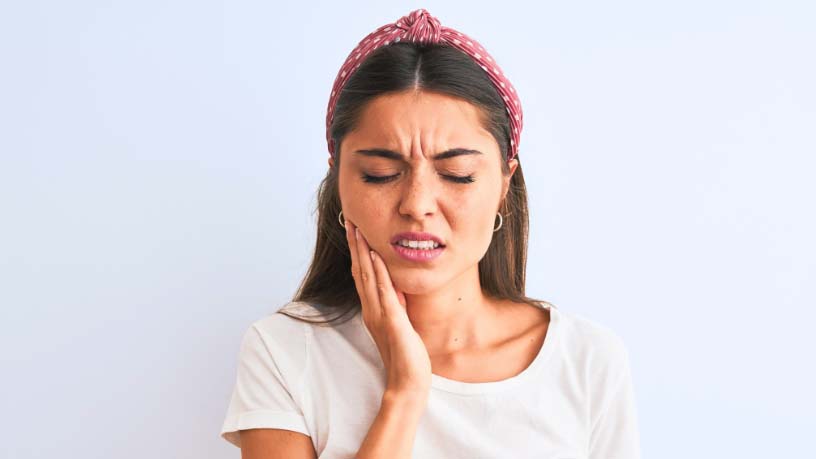On this page
Key takeaways
- You may need a tooth taken out of you have tooth decay, gum disease, an infection, an impacted wisdom tooth or in preparation for orthodontic treatment.
- After a tooth extraction, it’s normal to expect some discomfort, which can usually be controlled with pain relief medication.
- Avoid eating and drinking anything hot, smoking, alcohol and vigorous exercise for 24 hours after having a tooth removed.
Before the procedure
There are many reasons a tooth may need to be removed, such as tooth decay, gum disease, infection around the tooth, impacted wisdom tooth, removal of a tooth before orthodontic treatment (braces) and the removal of a persistent wobbly (baby) tooth.1
Before going to your appointment, Dr Madden recommends these strategies:
- If your tooth is being removed using local anesthetic, check with the dentist that you can have something to eat beforehand to reduce the risk of feeling faint. Remember, too, that you may be asked not to eat until the numbness wears off, which could be a few hours later.
- Leave plenty of time for your appointment to avoid running late or rushing, which will only add to your anxiety.
- Consider asking a friend or relative to attend the appointment with you.
- Let your dentist know if you are feeling anxious so that extra time can be booked if needed.
What to expect during an extraction
Dr Madden says the dentist will check that the local anesthetic has worked, numbing your tooth and gums, before starting the procedure.
“You will be aware of pressure being applied to the tooth, which may feel like ‘pushing’ or ‘pulling’, depending on where the tooth is positioned in your mouth,” Dr Madden explains. “The dental assistant may support your head during these movements. There may also be unusual noises such as cracks and crunches, but this is all part of the process.”
This happens because the dentist is applying pressure all the way around the tooth with specially designed instruments to loosen it. Once this is done, forceps are used to rotate the tooth in a special way while pressure is applied. Once the tooth is extracted, the dentist will check to make sure all the tooth has been removed, including the roots.
“An x-ray may be taken to confirm this,” Dr Madden says. “Occasionally, a suture (stitch) may be needed to keep the socket closed and help healing. These are often resorbable and will come out on their own.”
Your dentist will ask you to bite down on a piece of gauze if there is bleeding after the extraction.
What to expect after the extraction
“It is normal to expect a little discomfort once the anesthetic has worn off,” Dr Madden says.
“This can be from the site the anesthetic was administered and from the tooth socket (the hole in the jawbone where the tooth used to be), especially if the extraction was difficult. Usually, simple analgesics such as paracetamol and ibuprofen (if there is no allergy) should be sufficient to keep the pain under control, but if not, contact your dental surgery for advice.”
Dr Madden notes that some teeth extractions are complex.
“For example, for wisdom teeth, a surgical approach is sometimes needed, where the tooth is divided into sections, bone may need to be removed and each piece removed separately,” she explains.
“If the dentist thinks the extraction is going to be difficult, they may offer options such as treatment under sedation or general anesthesia with a specialist oral surgeon.”
Find your nearest Bupa Dental Clinic
Care after the extraction
Your dentist will advise you on how to keep your mouth clean while you are healing, when to eat/drink after the procedure and what to rinse your mouth with. Dr Madden says this includes:
- avoiding eating or drinking anything too hot immediately afterwards
- avoiding eating sticky or crunchy food to avoid food getting stuck in the socket while it is healing
- rinsing with warm salt water after 24 hours to keep your mouth clean
- gentle, but thorough, tooth brushing and flossing
- not smoking or drinking alcohol during the first 24 hours after the procedure
- avoiding vigorous exercise immediately after the extraction.2
“The soft tissues in your mouth should heal within a few weeks, but it can take the bone below the gum a few months to fully heal,” Dr Madden says.
Possible complications
“Occasionally, you can get an infection after a tooth extraction,” Dr Madden says.
“This is more likely to happen when the tooth extraction is difficult, such as a wisdom tooth, and if the patient is a smoker, although this is not always the case.
“If the discomfort does not seem to be improving, or if there is facial swelling, an increased temperature and/or a general feeling of being unwell, you should contact your dentist or medical practitioner.”

At Bupa, trust is everything
Our health and wellbeing information is regularly reviewed and maintained by a team of healthcare experts, to ensure its relevancy and accuracy. Everyone's health journey is unique and health outcomes vary from person to person.
This content is not a replacement for personalised and specific medical, healthcare, or other professional advice. If you have concerns about your health, see your doctor or other health professional.
1 Healthdirect. (Last reviewed 2023, March.) Tooth extraction. Healthdirect.
2 Healthdirect. (Last reviewed 2023, March.) Tooth extraction. Healthdirect.
You might also like
7 simple ways to look after your dental health at home
You might have brushed your teeth every day of your life, but you may be getting some things wrong. Learn how to improve your dental game with expert tips.
The importance of oral hygiene
Bupa dentist Dr Malcolm Duff explains why looking after your teeth and gums should be an important part of your daily routine.
Home teeth whitening: Is it safe?
Home teeth whitening kits might seem like a great idea, but they aren’t always what they’re cracked up to be. Discover whether they’re safe or effective.
Bruxism: The teeth disorder you might be sleeping on
If you’re having trouble sleeping, your teeth might be to blame. Find out how bruxism may be affecting you.





